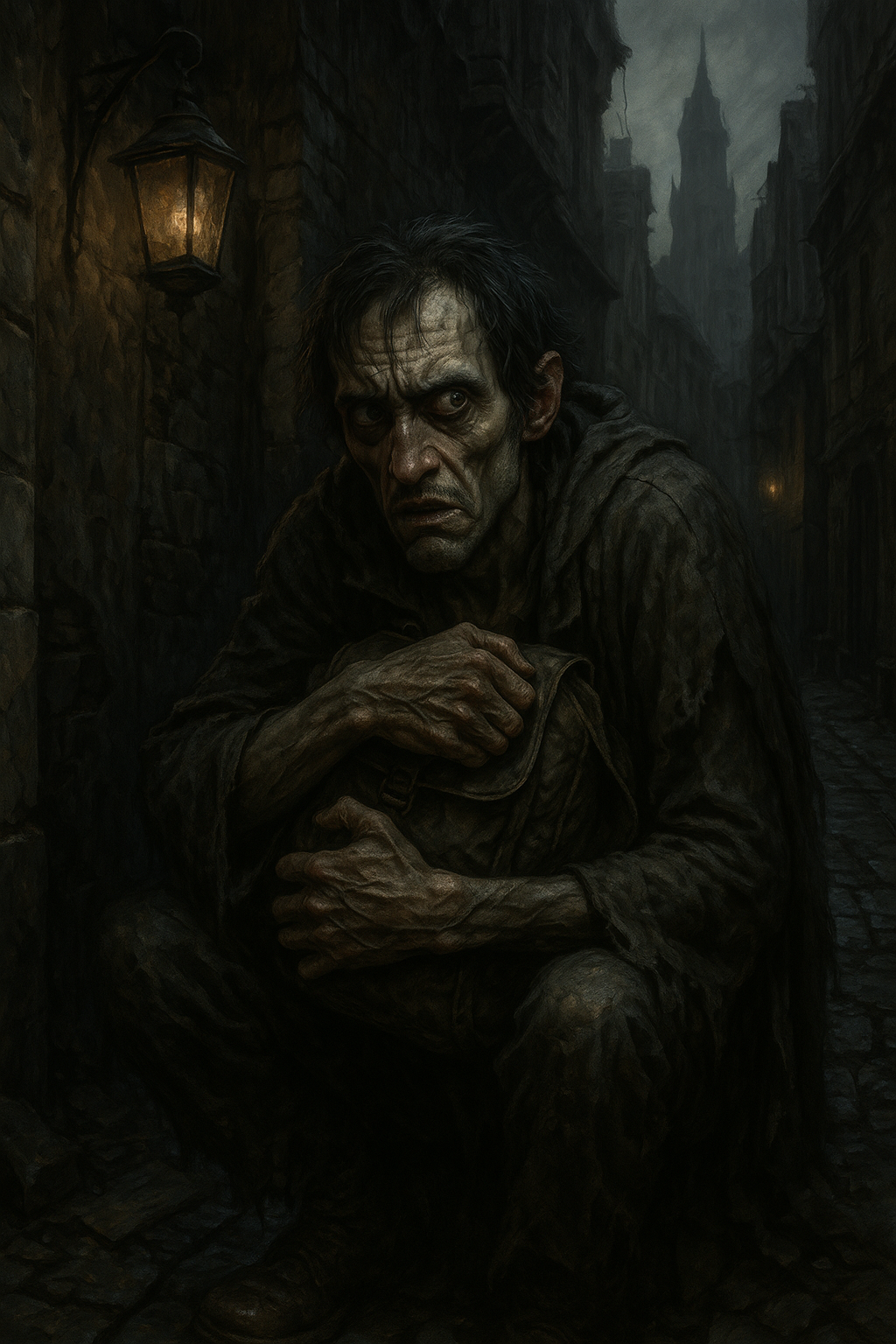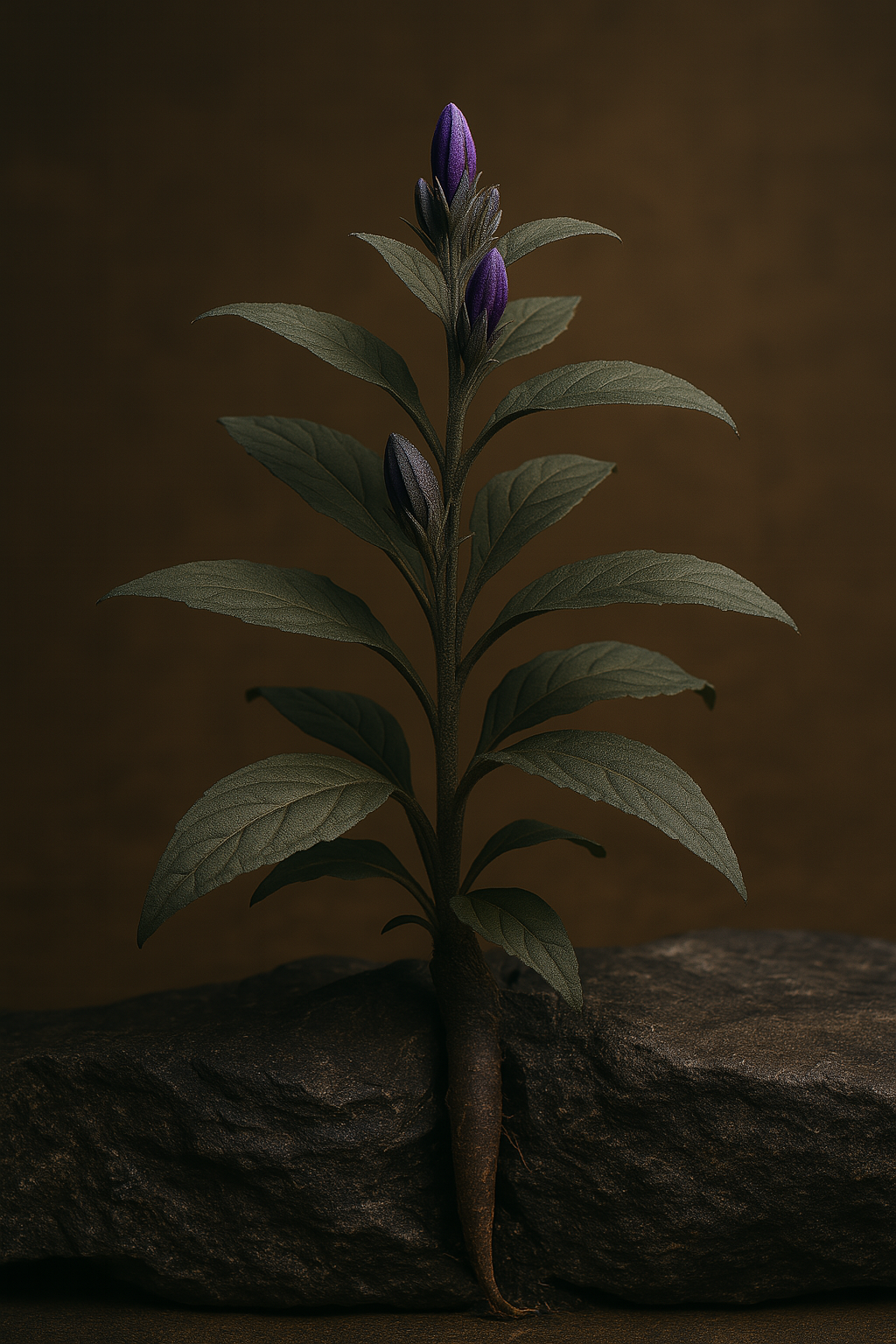Blackjaw Dependency Syndrome
“There’s no such thing as a casual Blackjaw user. Only those who haven’t yet realized the root has claimed them.”Prolonged or repeated use of Blackjaw Root can result in a complex affliction known as Blackjaw Dependency Syndrome (BDS). Commonly known as 'Blackjaw,' BDS is a debilitating condition with both neurological and physical origins, often accompanied by severe psychological effects. This affliction is a neurological, physiological, and psychological syndrome that devastates its victims across every axis of well-being. Blackjaw Root is the gnarled, dark-purple root of the rare Blackjaw Plant that grows only in the volcanic fissures of the Firepeak Divide, a plateau found within the Trollstep Mountains. The plant itself lies low against the rocks, bearing tarnished silver leaves slick with oily residue, easily mistaken for a creeping weed until dug from the stone. It thrives in the mineral-rich basalt cracks that define the region and produces a potent alkaloid brew unlike anything else found in Nehwon. The root earned its name from its most visible effect: the deep black staining it leaves behind on the gums and tongue of those who consume it. This staining can last for days, and with frequent use, becomes permanent. Despite its bitter, acrid taste, Blackjaw Root is highly sought after by certain circles—particularly ironworkers in Lankhmar’s forge districts, pit-fighting gladiators in Sarheenmar, and long-haul caravan drivers traveling dangerous routes like the Sea of Dust. When chewed or brewed into tea, Blackjaw floods the user’s system with a volatile blend of alkaloids and trace volcanic stimulants. The immediate effects include:
- Heightened stamina
- Increased muscular responsiveness
- Temporary hyper-focus
However, the consequences are brutal. Even a single use can result in withdrawal symptoms lasting for days or even weeks: tremors, irritability, emotional collapse, and vivid hallucinations. Continued use leads to far worse—degeneration of nerve endings, chronic muscle spasms, erratic movement, and deep physical fatigue. Gums and lips turn dark permanently. Speech becomes slurred. Focus breaks. Mood swings intensify. And eventually, the mind begins to lose its grip. Continued use leads to:
- Neurological decay
- Muscle spasms
- Nervous tics
- Permanent disfigurement
Causes
Why Do Users Continue Taking Blackjaw Root?
Despite its well-known dangers, those addicted to Blackjaw Root often cannot stop using it—not simply because of physical dependency, but due to how the root reshapes their perception of need and control.
Blackjaw Root doesn't just stimulate the body; it hijacks the user's reward system. The alkaloids in the root trigger powerful surges of dopamine and adrenaline—so intense that users describe the experience as becoming more alive than alive. This euphoria becomes inseparable from the user's sense of self, especially in those whose livelihoods depend on endurance, speed, or strength. Gladiators, forge-workers, caravan drivers—these are not leisurely roles. Blackjaw makes them feel invincible, and that sensation becomes harder to surrender than the root itself.
Withdrawal is brutal—not just physically but existentially. Once you've glimpsed what you could be under the root’s influence, going back to your normal, aching, tired body feels like death. Users often spiral deeper into addiction not because they want the high, but because they fear the weakness that returns without it.
Why Do New Users Try It, Knowing the Risks?
The allure of Blackjaw is multifaceted. While its reputation is infamously dark, it carries the same mystique that dangerous things often do—a forbidden edge that only the strong can ride without falling off.
Desperation drives many to it. A father supporting a family through long hours at a forge, a soldier marching for days without rest, a courier risking bandits and sandstorms—all of them might reach for a root they swore they’d never touch when the pressure becomes too much.
Cultural glorification also plays a role. Stories circulate of legendary drivers who crossed the Sea of Dust in record time while chewing the root, or duelists who fought off entire gangs after brewing it in their tea. Blackjaw has become synonymous with performance, not just addiction.
Peer pressure in certain trades can make abstinence seem like weakness. “Everyone in the pits is on it,” a gladiator might say. “You don’t chew, you lose.”
And of course, hubris is universal. “I’ll only try it once. I’m stronger than them. I won’t get hooked.”
Symptoms
Stage I: Initial Exposure
Symptoms:- Light tremors in hands or jaw
- Restlessness, especially at night
- Mild jaw discomfort and gum sensitivity
"I thought it was just nerves. My hands wouldn’t stop shaking, even when I was still."
Stage II: Chronic Use
Symptoms:- Pronounced tremors and muscle spasms
- Blackening of gums and inner lips
- Fatigue alternating with hyperactivity
- Decline in motor control and coordination
- Cravings become daily
- Mood swings and irritability
- Paranoia and anxiety spikes
Stage III: Advanced Dependency
Symptoms:- Collapse from exhaustion
- Neurological disorientation (convulsions, loss of balance)
- Hallucinations and delirium
- Self-injurious behavior (e.g., compulsive mouth-scratching)
- Disconnection from reality
- Obsessive behavior tied to ritualistic consumption
- Muttering, pacing, and repetitive motions
Game Mechanic: In D&D 5e, after consuming Blackjaw Root, a character must succeed on a DC 18 CON Save or suffer progressive BDS symptoms. The severity is determined by use frequency and stage of addiction, determined by the DM
Prognosis
Addiction to Blackjaw Root is treatable, but the path to recovery is arduous, rare, and often incomplete. In the world of Nehwon, few survive full dependency unscathed, and fewer still recover fully without lingering effects.
1. Magical Intervention
Due to the deep neurological and physiological hooks of Blackjaw Root, mundane treatments alone rarely suffice.
- Greater Restoration is the most effective spell for severing the magical hold of the root, especially in early stages of dependency. However, even this powerful magic cannot restore lost trust, reputation, or physical damage already done.
- Lesser Restoration may alleviate symptoms like tremors or hallucinations temporarily, but it’s not a cure.
- Heal or Wish spells, when cast by high-level clerics, have been known to purge all traces of the toxin and its effects—but these spells are prohibitively rare and often guarded by religious or arcane orders.





Comments